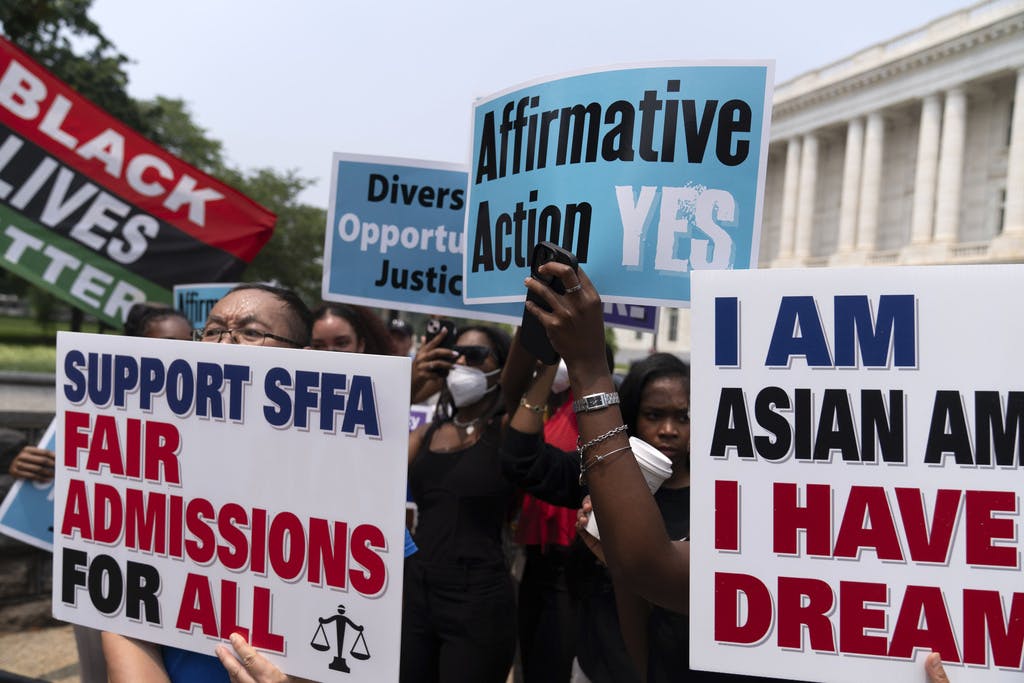‘All We Ask Is To Be Treated Equally’: New York Lawsuit Alleges Discrimination Against Asian-Americans in Education
The Supreme Court’s ruling banning affirmative action in higher education ‘is a principle that should apply to all manner of educational programs at large,’ the plaintiff’s attorney tells the Sun, adding that it’s ‘what we’re hoping to set a precedent for.’

A federal lawsuit is underway in New York challenging a decades-old science and technology program for violating the 14th Amendment’s equal protection clause, in a case that seeks to more firmly apply the Supreme Court’s ruling banning affirmative action in higher education to the K-12 level.
Chu et. al v. Rosa alleges that the state’s Science and Technology Entry Program — which allocates funding to 56 higher education institutions statewide to provide initiatives that enhance “academic enrichment in science and mathematics” to 7th-12th graders — is racially discriminatory. If white or Asian students want to apply, they are only eligible if they can prove they are “economically disadvantaged,” according to the STEP guidelines. Yet minorities — defined exclusively as African Americans, Hispanics, Alaskan Natives and American Indians — are eligible no matter what their economic status is.
Even before discrimination against Asian-Americans became the premise for Students for Fair Admissions v. Harvard — the Supreme Court case last year that ultimately banned affirmative action in college admissions — debate has been emerging for years about whether Asian students are treated unfairly in education.
Many studies “have uncovered overwhelming evidence” of “systematic and continuous discrimination against Asian-Americans in the college admissions process,” the Asian American Coalition for Education notes. To be accepted, Asian-American students have to score on average 140 points higher on the SAT than white students, 270 points higher than Hispanic students, and 450 points higher than Black students, one 2009 study found.
Although the Supreme Court’s affirmative action case put a spotlight on discrimination against Asians, some researchers, including a Columbia University sociology professor, Jennifer Lee, say in K-12, they may be given “a boost based on assumptions about race.”
While Asians face racism in some areas, Ms. Lee wrote for the New York Times she and other researchers “found that teachers’ positive biases of Asian American students sometimes led them to place even low-achieving Asian American students on competitive academic tracks, including honors and Advanced Placement classes that can be gateways to competitive four-year universities.”
A mother and education advocate in New York, Yiatin Chu, is challenging the state’s STEP program along with three Asian-American groups, all of which say they have members whose children are excluded from the STEP program because of being subject to race-based requirements.
Pacific Legal Foundation, the public interest law firm representing Ms. Chu, filed the complaint in January and tells the Sun it expects the named defendant — the state’s Education Commissioner, Betty Rosa — to respond in March. The New York State Education Department declined to comment on its upcoming response, citing pending litigation.
In the Students for Fair Admission case “the Supreme Court was very clear that outside of the context of prisons, there’s really only one compelling government interest left for these types of race-based programs, and that’s to remedy specific, proven instances of prior unconstitutional or unlawful discrimination that’s happened in the past,” an attorney with Pacific Legal Foundation, David Hoffa, tells the Sun.
Thus, New York’s program, which allows a Black child of a millionaire to be eligible but would bar an Asian student barely above the poverty line, he says, is a violation of the 14th Amendment.
The Students for Fair Admissions case “shouldn’t be read as just in the affirmative action context for college admissions, this is a principle that should apply to all manner of educational programs at large,” Mr. Hoffa says. “That’s the key takeaway from this case, and what we’re hoping to set a precedent for.”
“I’m connected to a lot of Asian parents, there’s definitely been more focus on ensuring that the system that we have, especially the public school system, is a fair one that does not put us at a disadvantage,” the mother and education advocate challenging the program in court, Yiatin Chu, tells the Sun. “All we ask is to be treated equally, not asking for anything more. But when we see cases where we are deprioritized or ineligible, because of our race, we need to speak up and fight this.”
“Certainly, it’s being divisive,” Ms. Chu, who lives in New York City, says. “My daughter’s a seventh grader and she sits in a classroom with 25 other other students. And she doesn’t qualify because she’s not low income, yet someone, a Black classmate, who is of similar socio-economic status would qualify simply because of her race. That I find unfair.”
Although Ms. Chu has been fighting against discrimination towards Asian-Americans since 2019, she was surprised the STEP program has been in place for nearly 40 years and “no one has questioned it.” As affirmative action and diversity, equity, and inclusion initiatives have been garnering attention across the country in recent years, it has “heightened people’s attention” to race-based programs, Ms. Chu adds.
“It’s been going on for so long that it kind of flew under the radar,” she says. “But I think with the SCOTUS ruling, people are paying attention.”

